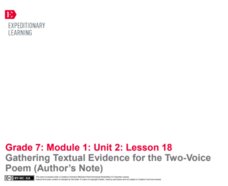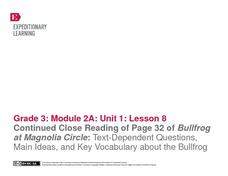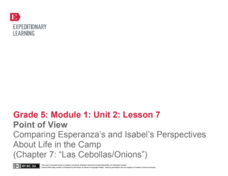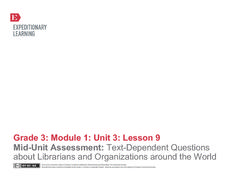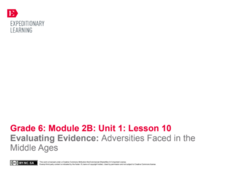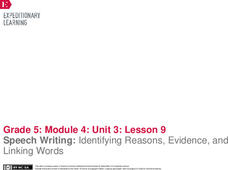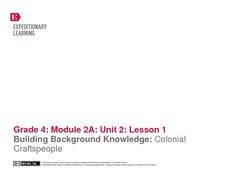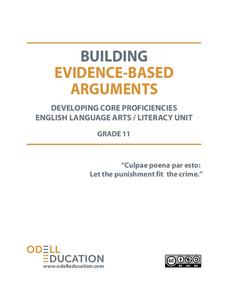EngageNY
Pitching Your Claim with Best Evidence
Does Bud use his rules to survive or thrive? That is the driving question of a lesson plan following the reading of Bud, Not Buddy by Christopher Paul Curtis. In an argument essay prewriting activity, pupils use textual evidence to...
College Board
2006 AP® English Language and Composition Free-Response Questions
What does your lawn decoration say about you? The 2006 AP® English Language and Composition Free-Response Questions offers three prompts in which scholars express themselves through essay writing. One of these tasks includes analyzing...
EngageNY
Using Effective Search Terms: Researching Screen Time
The proof is in the reading. Scholars read an article, "Attached to Technology and Paying the Price," and answer text-dependent questions. Next, they complete a Venn diagram to contrast two authors' use of evidence on the topic of screen...
Warren County Public Schools
Citing Textual Evidence
By using explicit textual evidence, individuals can strongly support their ideas and opinions. The presentation suggests in order to use explicit textual evidence, one must state their idea, cite evidence in the text that led to the...
EngageNY
Gathering Textual Evidence for the Two-Voice Poem (Author’s Note)
Writers take a look at how to gather evidence from the information text in the unit that connects to Salva and Nya’s story. They complete a Gathering Evidence from Informational Texts sheet to guide their work. Pupils then use the...
Making Evidence-Based Claims: Grade 7
New ReviewThe most effective way to support an argument is with clear and relevant evidence. As seventh graders read and listen to Cesar Chavez's California Commonwealth Club Address, they work through five sections of a textual analysis unit,...
EngageNY
Continued Close Reading of Bullfrog at Magnolia Circle: Text-Dependent Questions and Vivid Words and Phrases
As 3rd graders continue reading Bullfrog at Magnolia Circle, they focus on the concepts of predator and prey in the fifth lesson plan of this unit. Scholars further develop their ability to answer questions using evidence from the text...
EngageNY
Close Reading of Bullfrog at Magnolia Circle: Text-Dependent Questions, Main Ideas, and Key Vocabulary about the Bullfrog
As your 3rd grade class finishes reading Bullfrog at Magnolia Circle, the eighth lesson plan of this unit helps readers from an understanding of the very specific information on the final page of the book. As with the entire unit,...
EngageNY
Continued Close Reading of Bullfrog at Magnolia Circle: Text-Dependent Questions and Vivid Words and Phrases
In the third activity from this unit based on the book Bullfrog at Magnolia Circle, learners focus on using specific details from the text-to-answer questions about the habitat of bullfrogs. While reading the text, young scholars are...
Student Achievement Partners
"The Glorious Whitewasher" from The Adventures of Tom Sawyer by Mark Twain with Mini-Assessment
It's the classic scene: Tom Sawyer is whitewashing a fence. Expose your learners to Mark Twain's humor while reinforcing reading comprehension. Eighth graders are encouraged to read and reread, achieving as much exposure to the text as...
EngageNY
Point of View: Comparing Esperanza's and Isabel's Perspectives About Life in the Camp (Chapter 7: "Las Cebollas/Onions")
Explore point of view and more with a Common Core-designed instructional activity. Learners experience different points of view by representing one of two characters from Esperanza Rising during a partner discussion. They must use...
EngageNY
Mid-Unit Assessment: Answering Text-Dependent Questions About Librarians and Organizations Around the World
This is a skills-based assessment that asks test takers to use textual evidence to determine the main idea of an excerpt from an informational text as well as respond to text-dependent questions. The assessment is the middle point...
EngageNY
Evaluating Evidence: Adversities Faced in the Middle Ages
How is that relevant? Scholars gain an understanding of the words relevant and compelling. They then go back to the End of Unit 1 Assessment Prompt: Adversity in the Middle Ages and look at the second bullet that pertains to relevant and...
EngageNY
Identifying How Text Features Support Arguments: “The Exterminator"
Half and half. Split the class in half to gain a full understanding of sidebars. Pupils work in groups to discuss sidebars in text. Half of the groups read Seriously Sick, and the other half reads Killer Genes. They read using...
EngageNY
Speech Writing: Identifying Reasons, Evidence, and Linking Words
Enjoy the view. Scholars continue viewing a video of an opinion speech, this time identifying the supporting evidence the speaker employs. After watching, they work in small groups on their shared writing projects, crafting a body...
EngageNY
Using Multiple Resources of Information: Creating a Cascading Consequences Chart about DDT and Practicing a Fishbowl Discussion
For every action there is a consequence. Scholars continue their work on creating a cascading consequence chart about DDT using Welcome Back, The Exterminator, Rachel Carson: Sounding the Alarm on Pollution along with graphic organizers...
National Math + Science Initative
Reading an Informational Text: "It All Started with Sputnik"
Sputnik was one of the greatest scientific advancements of the 1950s, and this reading lesson does it justice. Pupils start off with pre-reading questions and a video. They then read an excerpt from an article, which is accompanied by...
EngageNY
Writing to Inform: Analyzing a Model Using a Rubric
Learn to write right. Scholars analyze the model essay Adversity Faced by Townspeople in the Middle Ages. They discuss the essay and make annotations working with an elbow partner. Learners then take another look at the essay using a...
EngageNY
Building Background Knowledge: Colonial Craftspeople
In the first lesson plan of this unit on colonial trade, fourth graders gain background knowledge of different jobs performed by early colonists. The class begins with a slide show presentation that includes a variety of great...
Odell Education
Reading Closely For Textual Details: Grade 8
Only a thorough understanding of history can save us from repeating it. Practice close reading skills with an eighth grade unit that focuses on 19th century America, including European immigration into Ellis Island and Frederick...
Odell Education
Building Evidence-Based Arguments: "Cuplae poena par esto: Let the punishment fit the crime."
Should a criminal's punishment match the crime? An argumentative writing plan explores this question as class members investigate a variety of mixed-medium sources by experts in the field, form evidence-based claims, and support them...
Curated OER
Advertising in the Contemporary World: An Introduction to Persuasive Texts
Beginning a persuasive writing unit with your middle schoolers? Approach it through something that persuades us all: advertising! Through studying video and print advertisement, your class will practice Common Core skills for reading...
Curated OER
Kumeyaay Indians
Useful for literary analysis, citing textual evidence, or summary skills, this lesson about the Kumeyaay Indians would be a good addition to your language arts class. Middle schoolers read novels and summarize the literature in their own...
Curated OER
The Effects of Slavery
The emotional and spiritual oppression of slavery in the African-American experience is the focus of this instructional activity. Middle schoolers analyze various texts by Frederick Douglass and Maya Angelou related to freedom and...






